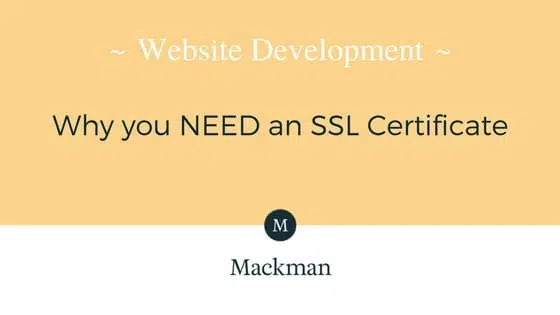We cannot stress this enough: make applying an SSL certificate to your site a top priority for 2017, or miss out on a Google rank boost.
Back as far as August 2014, Google announced that switching websites over to HTTPS via the use of an SSL certificate would give website owners a minor ranking boost. As it prefers sites that are secure, trusted and certified.
When Google says “jump”, everyone usually says “how high?”. But serving sites via HTTPS seems to have been widely undervalued by both website owners and the marketing industry in general. However, this year Mackman is encouraging our clients to catch the wave before the inevitable crunch.
What is HTTPS?
HTTPS stands for “HyperText Transfer Protocol Secure” or “HTTP over SSL” (recently superseded by TLS). Internet users will be familiar with it as a little green padlock next to the URL in your address bar.
Generally speaking, HTTPS is the same as HTTP (HyperText Transfer Protocol) – it’s just a secure version.
What does it do?
HTTPS ensures that confidential information, such as payment details, are secured in order to prevent unauthorised access. HTTPS was developed to allow secure transactions on websites offering ecommerce services. But, it also offers basic protection to users on informational websites, as it encrypts the information sent via contact forms too.
How does an SSL certificate come into it then?
HTTPS is secure because it uses SSL (Secure Sockets Layer) (more recently TLS (Transport Layer Security)) to encrypt and move data safely. The SSL certificate (which commonly refers to both SSL and TLS) shows visitors that all of the information entered on your site will remain private and cannot be intercepted in the process of being delivered. This helps Google to know that the site is trustworthy and takes the security of it’s users seriously. The average spam site owner isn’t going to bother applying an SSL certificate to their site.
Certificates also require domain/organisation validation. This ensures that URLs can be verified as linking to the business that it claims to.
What are the benefits?
Aside from protecting your visitors information (which should really be the main selling point!) and increasing user/visitor trust, Google is using HTTPS as a ranking factor. It is clear from various studies that sites served via HTTPS demonstrate a ranking advantage over sites served via HTTP.
How do I add an SSL Certificate to my site?
Adding an SSL certificate to your site can be tricky. It requires uploading information to your server and ensuring that hyperlinks and plugins on the site are also able to be served by HTTPS.
However, Mackman are now offering the addition of SSL certificates to sites as a service. This will help you to keep your visitors information secure, with the added benefit of helping your site to achieve the ranking boost that Google has suggested.
There are different types of SSL certificate, which require different amounts of time to implement depending on the age of the platform that your site is built on. The version that you need depends largely on the size and purpose of your site. So if you’re interested in increasing the security of your site, call the number provided below. We’ll be happy to get the ball rolling.
